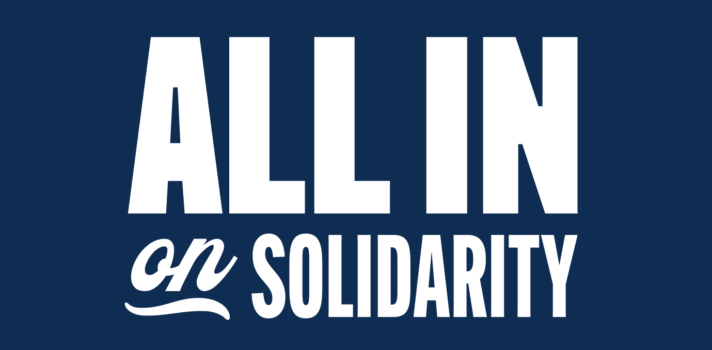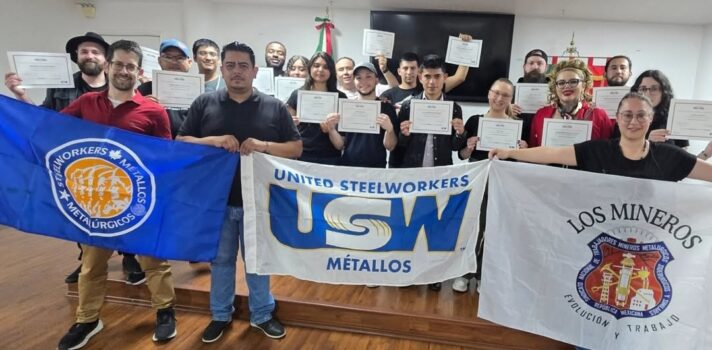MONTREAL, SEPT-ÎLES, ROUYN-NORANDA – Mining workers in Quebec are warning that Bill 59 will set back occupational health and safety in their industry by more than 40 years, to a time when deaths in the sector numbered in the hundreds.
Representatives of United Steelworkers/Syndicat des Métallos members working in mining operations in the North Shore, Northern Quebec and Abitibi regions held a news conference today to denounce Bill 59 rollbacks on health and safety prevention measures and accountability measures related to occupational diseases and workplace injuries and deaths.
“Health and safety prevention, based on joint involvement of workers and employers, was created in Quebec’s mining sector to stop the carnage. It was later enshrined in the law, but was restricted to industrial workplaces due to opposition from employers to more widespread application of the legislation,” said Dominic Lemieux, USW Quebec Director.
“Now this bill will weaken prevention measures by removing minimum standards and entrusting to the bosses alone decision-making on prevention programs and related measures. It goes so far as to deprive injured workers and victims of occupational diseases of care and support. This is not a ‘modernization’ of the law. It is seizing an opportunity to roll back the clock 40 years on health and safety while the focus is on the pandemic,” Lemieux said.
Joint health and safety committees in workplaces are crucial to effective prevention programs, said Nadine Joncas, USW health and safety representative at ArcelorMittal’s Mont-Wright mine in Fermont.
“The reality of workplace health and safety is that the workers are the ones who live it. Prevention measures are better tailored, more effective and enjoy greater support when workers are involved in the decision making. Everyone loses if decisions are made by the employer alone. It will lead to deaths and more accidents,” Joncas said.
Joncas also denounced Bill 59 provisions that would allow employers to create a single health and safety committee, with only one worker representative, for multiple work sites owned by the same employer.
“This change will weaken prevention. Circumstances are quite different between the mine in Fermont, the railroad, and the pellet plant in Port-Cartier, workplaces that are several hundred kilometers from each other. Putting everything together in a single committee will water down prevention programs,” she said.
USW Local 9291 President André Racicot raised concerns about the impact of Bill 59 at the Westwood mine in Abitibi, which has had its share of serious incidents in recent years, including five collapses that trapped workers underground and a miner’s death in 2017.
“They say in the mines that the laws and regulations were written with the blood of the miners. These rollbacks will compromise safety and lead to even more tragedies,” Racicot said.
To make matters worse, injured or sick workers will also find it harder to get compensation, he added.
“You’ll have to go through the Twelve Tasks of Asterix to get your work-related deafness recognized, because the standards will be so strict. More than 22.5 decibels for two years – and in both ears, not just one! Thousands of workers will be deprived of hearing aids, after their work has stolen their hearing. And employers will have even less incentive to reduce noise in the workplace if it costs them less in compensation,” Racicot said.
The same logic will apply to many occupational diseases and risks, such as cancers and lead exposure. The criteria are so strict that they will leave sick workers out in the cold, the Steelworkers warn. Worse, the legislation will place a limit on the number and types of treatments available to workers.
Mining companies have a history of systematically challenging the recognition of occupational illnesses and accidents, forcing workers (and their union when there is one) to go to court in order to gain the right to compensation and support for rehabilitation.
“If the law lowers the minimum level of prevention and makes it more difficult to get compensation, the mining companies certainly won’t do right by workers. They will do what the law allows them to get away with, which is what happens elsewhere in the world where the laws are less strict. The government must not cut corners,” said Eric Savard, President of USW Local 9449 at Raglan Mine (Glencore).
The United Steelworkers/Syndicat des Métallos, affiliated with the FTQ, is the largest private-sector union in Quebec, representing more than 60,000 workers in all economic sectors.
Share on Facebook



